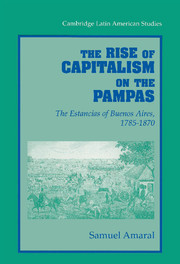Book contents
- Frontmatter
- Contents
- List of maps, figures, and tables
- Weights and measures
- Preface
- THE RISE OF CAPITALISM ON THE PAMPAS
- 1 Introduction
- PART I ESTANCIAS
- PART II CONDITIONS OF PRODUCTION
- PART III HUMAN ACTION
- PART IV RESULTS
- 10 Profit
- 11 Prices and marketing
- 12 Markets
- 13 Conclusion
- Appendix A Profit rates and present value
- Appendix B Probate inventories
- Appendix C Prices, exchange rates, and trade statistics
- Glossary
- Bibliography
- Index
12 - Markets
Published online by Cambridge University Press: 30 March 2010
- Frontmatter
- Contents
- List of maps, figures, and tables
- Weights and measures
- Preface
- THE RISE OF CAPITALISM ON THE PAMPAS
- 1 Introduction
- PART I ESTANCIAS
- PART II CONDITIONS OF PRODUCTION
- PART III HUMAN ACTION
- PART IV RESULTS
- 10 Profit
- 11 Prices and marketing
- 12 Markets
- 13 Conclusion
- Appendix A Profit rates and present value
- Appendix B Probate inventories
- Appendix C Prices, exchange rates, and trade statistics
- Glossary
- Bibliography
- Index
Summary
Except for specially authorized ships (navíos de registro) sailing from Spain, the port of Buenos Aires was legally closed from 1620 to 1778. Contraband trade was widely practiced, however, especially after the establishment of a Portuguese outpost in Colonia do Sacramento in 1680. Some barriers fell down in 1778 with the enactment of the Free Trade regulations, but true free trade was not implemented before the May 1810 revolution. After the revolution merchants were free to send their goods to any destination and to receive them from any place. That had not been the case in the past. After 1810 Spain vanished as Buenos Aires's main trading partner. Great Britain, continental Europe, and the United States soon emerged as the main suppliers of goods ranging from textiles to wine and from iron tools to trinkets. These countries were also the main destination of Buenos Aires exports.
The overall result of the aggregate estancia activity can be seen by paying attention to the evolution of products and markets. This chapter shows that in spite of producing a limited range of products for a few main markets, the Buenos Aires producers successfully adjusted their production to the evolving pattern of overseas demand for livestock by-products. In order to show the evolution of markets and products from the 1810s to the 1870s, the first section of this chapter studies Buenos Aires's main customers according to export value figures; the second section studies the evolution of markets for the different Buenos Aires products, according to import figures into those countries; and the third section studies the markets for each product.
- Type
- Chapter
- Information
- The Rise of Capitalism on the PampasThe Estancias of Buenos Aires, 1785–1870, pp. 250 - 284Publisher: Cambridge University PressPrint publication year: 1998



